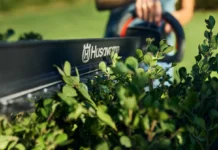By Kevin O’Brien, SPAR Group Sustainability and Risk Executive
Water is the lifeblood of agriculture, a major socio-economic driver for billions of people, and integral to South Africa’s economy and food supply chain. With climate change accelerating, securing and preserving water resources has become a critical priority.
In 2023 alone, glaciers lost more than 600 gigatons of water – the largest mass loss registered in 50 years. Nearly two billion people rely on water from glaciers, snowmelt, and mountain runoff for drinking, agriculture, and energy production. The urgency to limit global warming to 1.5°C is now even greater, as it was confirmed in 2024 that the 1.5°C threshold had been breached for a full 12 months for the first time.
Efforts to reduce carbon emissions and safeguard water are particularly crucial for a water-scarce country like South Africa. Many agricultural operations require clean and reliable water resources, but disrupted access can halt food production. Lack of clean, available water can impact processing and packaging facilities that depend on high-quality water. SPAR retailers, for example, must comply with food safety and hygiene standards that require clean water. Any disruption to water supply could result in operational and financial risks, as well as significant costs.
For The SPAR Group, building water resilience is essential. Many regions across South Africa face water-related challenges, including flooding, compromised water quality, and scarcity due to drought and ageing infrastructure. In collaboration with the WWF Water Risk Filter team, we have begun a comprehensive water risk analysis to fully understand the water risks we face in our value chain. The results of this analysis will guide our short, medium, and long-term commitments and actions required in both our operations and supply chain.
The UN’s World Water Development Report underscores that, when managed sustainably and equitably, water can be a source of peace and prosperity. It promotes community stability and contributes to disaster risk reduction. However, when water is scarce, polluted, or difficult to access, food security is undermined, livelihoods are lost, and conflict can arise.
As a key player in ensuring South Africa’s food supply remains stable, The SPAR Group is intensifying its drive towards a sustainable future, prioritising water and energy conservation. For too long, water has been taken for granted – turn on a tap, and it’s always been there, yet millions of people have never had that privilege. Addressing this is not just a business priority but a societal necessity. In collaboration with
The stark reality is that Cape Town narrowly avoided a Day Zero crisis in 2017, when municipal water supplies would have been largely switched off. This was akin to a severe form of load-shedding – a crisis that once seemed unimaginable. Despite recent rains, there is growing concern that Day Zero could become a reality in other areas like Gauteng unless significant action is taken to secure and expand water supplies while addressing leaks and wastage. I think Gauteng was the most recent casualty leading to water restrictions and disruptions. Added to that is lack of capacity at a municipal level to maintain water quality which leads to contaminations and health risks.
The solution cannot be a short-term, box-ticking exercise but needs all stakeholders onboard to invest in the right infrastructure and water conservation methods. We need a long-term, sustainable approach that expands water accessibility to those who have never had reliable supplies. This requires a fundamental shift in how businesses and society approach sustainability.
SPAR’s sustainability initiatives already show the immense benefits of this approach. For example, leveraging data to optimise energy use has demonstrated potential electricity savings of up to 46%. By applying similar data-driven strategies to water management, we anticipate significant water savings as well.
Understanding past practices, analysing data, and re-evaluating resource consumption are critical steps in mitigating climate change’s devastating impact. Agriculture is a key pillar of SPAR’s operations, and climate-induced challenges – such as droughts that reduce crop yields – have significant financial implications. Lower yields can drive up prices, negatively impacting consumers and influencing their purchasing decisions.
The SPAR Group is acutely aware of its responsibility in ensuring a stable food supply chain. Our response to the water crisis is multi-faceted. We are implementing water management practices that reflect strong water stewardship, installing water-efficient technologies, and enhancing water storage infrastructure across the Group. Additionally, we plan to assess our suppliers’ water dependencies and impacts over the next two years. Somewhere here I think maybe Kevin assist add examples of work done to assist associated farming projects and vulonerable communities – could add another layer of weight. We recognise the importance of participating in water stewardship initiatives in the communities where our business operates. One of our key efforts involves SPAR’s Eastern Cape distribution centre, a significant water user in the Bluewater Bay catchment, which includes the Zwartkops and Kwanagxabi rivers, as well as the surrounding wetlands. We are actively involved in a project that aims to rehabilitate these water resources by cleaning sewage and removing plastic pollution.
Innovation in sustainability must be embedded in the DNA of businesses. The outdated model of companies merely extracting resources from communities must evolve into one where businesses actively contribute to sustainable solutions. Companies must question how they can strengthen the systems that support the communities they serve, particularly when it comes to water resilience. This cannot be an annual talking point – it requires an ongoing commitment. More companies and individuals must recognise their roles as stewards of water sustainability because the consequences of inaction are far too dire to ignore.








